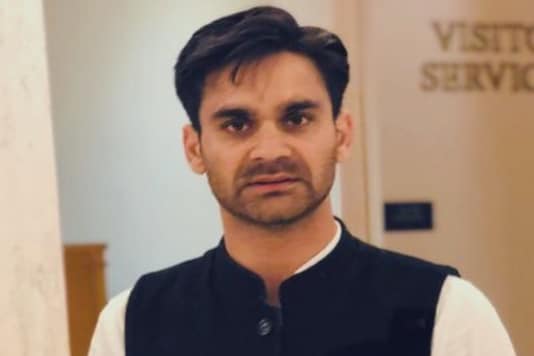Waheed-ur-Rehman Parra, the top People’s Democratic Party (PDP) politician arrested by the National Investigation Agency (NIA) on Wednesday, is facing charges of having used a government vehicle to transport terrorists and of conducting negotiations with jihadist groups on behalf of former Chief Minister Mehbooba Mufti, highly-placed government sources have told News18.
The PDP has denied the allegations, with Mufti alleging he had “earned the wrath of a hostile and communal government” for his commitment to democratic politics.
Sources said Parra’s arrest is the outcome of an investigation into rogue Jammu and Kashmir Police officer Davinder Singh — held on charges of attempting to help a Hizb-ul-Mujahideen terrorist escape across the Line of Control — widening into a broader inquisition of links between political actors in Kashmir and jihadist groups.
The arrest comes ahead of elections to District Development Councils in Jammu and Kashmir scheduled to begin this weekend, which Parra had filed papers to contest.
In a statement released on social media, Mufti noted that Parra had been hailed by now Defence Minister Rajnath Singh for helping strengthen democracy in Kashmir. The PDP and BJP had allied to form the government following the 2016 elections and held power until central rule had to be imposed among massive, Islamist-led street protests.
However, government sources said the charges against Parra centre around negotiations he is alleged to have conducted with Hizb-ul-Mujahideen commanders in southern Kashmir — the PDP’s most important regional base — in the run-up to the 2014 elections to Jammu and Kashmir’s Legislative Assembly.
The sources alleged that Parra also had contact with the leadership of Lashkar-e-Taiba in southern Kashmir, as part of an ongoing dialogue with the PDP to scale back Fidayeen suicide-squad attacks in return for scaling back of counter-terrorism operations.
Government sources said Davinder Singh, who hails from the violence-ravaged south Kashmir district of Tral, played a role in facilitating these contacts. The sources, however, declined to discuss details of the terrorists Parra is alleged to have transported, or other details of his activities, saying it could compromise ongoing investigations.
According to intelligence sources, among the key figures with whom Parra was alleged to have negotiated in 2015 was jihadist social media icon Burhan Wani, whose killing by police in the summer of 2016 sparked off the violence that led to the collapse of the government.
In essence, intelligence sources said their negotiations involved a promise to scale back operations against the Hizb-ul-Mujahideen in return for the support of the terrorist group and its parent political organisation, the Jama’at-e-Islami.
The negotiations are claimed to have facilitated the PDP’s electoral victories in southern Kashmir, in a campaign marked by intimidation and threats directed at the rival National Conference.
Following the PDP’s victory in 2016, the party controversially released several Islamist leaders involved in earlier large-scale street protests. However, Wani was killed in a police operation targeting another Hizb-ul-Mujahideen figure.
Leaders of the PDP and the Hizb-ul-Mujahideen are thought to have first begun to engage each other in 2003, when key leaders of the party are said to have opened negotiations with its then-head of operations in the Kashmir valley, Ghulam Rasool Khan, also known as ‘Engineer Zamaan’.
Intelligence sources said New Delhi hoped the contacts would help move forward from a failed attempt to revive secret ceasefire negotiations with the Hizb-ul-Mujahideen promoted by Prime Minister Atal Behari Vajpayee’s government — an effort which collapsed in 2000 amidst the assassinations of several of its protagonists.
Sources familiar with the negotiations say the government also hoped to draw the Jama’at-e-Islami into mainstream democratic politics, as it had been prior to 1989.
Intelligence sources said that in the following years, contact between PDP leaders and the Hizb-ul-Mujahideen had been quietly encouraged in the hope of winning over.
Earlier, National Conference leaders are also believed to have maintained contact with jihadist commanders, sometimes in the interest of their personal security. Hizb chief Shah’s youngest son Syed Abdul Wahid landed a medical degree — and then a job at a prestigious government medical hospital — with a little help from the Intelligence Bureau, according to former Research and Analysis Wing chief AS Dulat. Two of Wahid’s siblings, Syed Shahid Yousuf and Syed Shakeel Yusuf, also landed government jobs.
“Frankly,” a senior intelligence official said, “you’d be hard to find anyone in Jammu and Kashmir politics, in any party, who hasn’t had some degree of contact with terrorists, often with the implicit sanction of the authorities. Parra’s arrest may lead to a lot of skeletons tumbling out of a lot of closets.”
In some cases, there are suggestions these complex contacts between politicians, the intelligence services and terrorists were manipulated to serve personal ends. Davinder Singh, for example, is alleged to have taken bribes to transport police constable-turned Hizb-ul-Mujahideen terrorist Naveed Mushtaq to safety — while at once telling the Research and Analysis wing he was recruiting the jihadist for an operation across the Line of Control.

